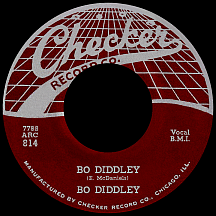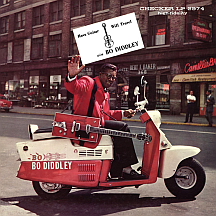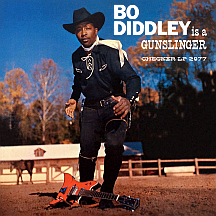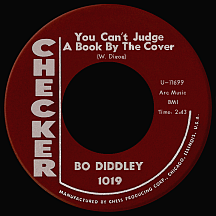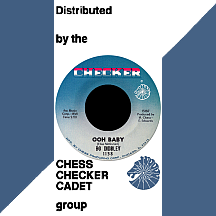BO DIDDLEY
They say you can't trademark a sound or style. At least that was the case for well over a century in the music industry...until the "blurred lines" of the mid-2010s, anyway. But sometimes a certain sound will be identified with one artist to the degree that it becomes a trademark, albeit one without monetary benefit. Bo Diddley drew from a combination of African tribal rhythms, gospel and his own "feeling," resulting in a style widely referred to since the 1950s as the "Bo Diddley beat." But as famous as he became for this rhythmic progression, its influence is largely taken for granted. Anyone who listens closely to Diddley's recordings, in any order of preference, will notice a wide variance of rhythm, sound and arrangements that fall into the "Bo beat" domain, yet each stands apart from his other works. He was a versatile artist with a stirring, blues-based vocal approach uniquely his own, who created blues, rock or pop music to reflect his mindset at any given time. Bo Diddley was an originator - not just a guy with one good idea, as far too many have branded him.
The southern Mississippi town of McComb was Ellas Otha Bates' birthplace in 1928; at age eight he and an older cousin, Gussie McDaniel, left his mother's home and traveled to Chicago. Living in Langley Avenue tenements on the city's south side, he assumed the McDaniel surname shortly afterwards. Church music sparked his interest and he took violin lessons for many years, studying classical form; later, he took up guitar. School was difficult; the "city kids" teased him for being from the "back woods," so at age 15 he started boxing to gain an edge in defending himself. During practice one day, someone called him a "bo diddley" as an insult, but he didn't understand what it meant. Around 1946, he started performing with Roosevelt Jackson, a fellow boxer, and Samuel Daniel, who was obsessed with Bill Eckstine and patterned his singing after the famous jazz baritone. They called themselves The Hipsters and played on the streets for tips, staying on the move because police would chase them away. Sometimes they made 20 dollars or more in one night and always divided it equally.
John Lee Hooker became his first modern music hero after "Boogie Chillen" was a hit in 1949; inspired to sing the blues, Ellas began imitating some of Hooker's guitar riffs. He'd gotten married at 18 to Louise Wellingham and worked in construction and carpentry, but couldn't get the music out of his system, though he didn't figure on making a living from it. Within a few years he was divorced and dating future second wife Ethel Mae Smith (nicknamed "Tootsy"), who lived in the same apartment building as Jerome Green, an occasional tuba player and street hustler who started collecting money for the trio and getting enough so they made out better, even with a four-way split! The Hipsters headed to Memphis in 1951 and played one of the city's hottest spots, the 708 Club on East 47th Street, where many popular blues acts (Muddy Waters, Howlin' Wolf) frequently appeared.
The trio became The Langley Avenue Jive Cats, evolving over the next few years as McDaniel took on the Bo Diddley persona and fronted a band with Jackson playing bass, Clifton James on drums, Billy Boy Arnold on harmonica, Jody Williams on guitar and Jerome shaking a pair of maracas, an addition most groups would find unnecessary but one that would be an essential part of the signature sound Bo was going for. Those maracas provided a "freight train" effect he liked, while an African "boom-boom-ch-boom" rhythm rounded things out. Song lyrics were often based on chants and rhymes Bo heard during his childhood, combined with immature insults, put-downs and slang terms commonly heard in, but not limited to, poverty-level neighborhoods.
It wasn't until he was 26 that Bo finally made a recording...on a home tape machine. He took this raw demo of "Bo Diddley" to Vee-Jay, a relatively new Chicago label that was starting to have some success with bluesman Jimmy Reed; A&R man Ewart Abner was appalled by it. So Bo worked up the courage to go to VJ's more seasoned competitor. Chess Records founders Leonard and Phil Chess heard something unique in his style and scheduled studio time to record a more polished version. Lyrics were somewhat nonsensical, as street-inspired songs can sometimes be: 'Bo Diddley buy his baby diamond ring...if that diamond ring don't shine...he gonna take it to a private eye...if that private eye can't see...he better not take the ring a-from me...' The flip side, "I'm a Man," was more about adult posturing: 'All you pretty women, stand in line...I can make love to ya baby, in a hour's time...I'm a man...spell m-a-n...man!' This debut single, on the Checker label, was a double-sided smash, reaching number two on the R&B best seller chart in June, its momentum eclipsed by Fats Domino's mega-hit "Ain't it a Shame" (though it did reach the top of the Most Played in Juke Boxes list). Immediately, Muddy Waters reworked "I'm a Man," retitled it "Manish Boy," and had a hit with his version a few months later. Meanwhile, Buddy Holly covered "Bo Diddley," though his version sat on the shelf until 1963, four years after his unforeseen death.
Some of the established Chess artists were in no rush to accept this "new kid," leaving Bo somewhat isolated, though he developed a bond with harmonica hitmaker Little Walter, who recorded his instrumental tune "Roller Coaster," a hit in July. He also got on well with vocal group The Moonglows, who supplied backing vocals on his second release, "Diddley Daddy," another R&B hit during that explosive summer while "Bo Diddley" was still in the top ten. He worked with different producers, but never saw the point in any of them, figuring he could "produce" his own creations without dealing with anyone who might alter his musical vision. In November, Bo and the band appeared on The Ed Sullivan Show; Ed brought out WWRL disc jockey Dr. Jive (also known as Tommy Smalls, the owner of Harlem nightclub Small's Paradise), who introduced four star peformers, each doing 90-second renditions of their hits. Bo Diddley offered up his namesake smash and was followed by LaVern Baker, The Five Keys and blasting sax man Willis "Gator Tail" Jackson.
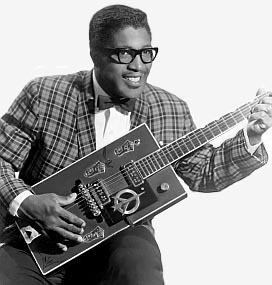
Bo was on a roll as his third single, "Pretty Thing," hit the R&B Juke Box chart near year's end. "Who Do You Love" is a rocking romantic love song to someone named Arlene, not either of his wives, yet mentioned three times in the lyrics. Nearly everything he recorded was original (sometimes credited to Ellas McDaniel, other times with an added "s," a common typo). He composed songs made famous by others, scoring a coup with "Love is Strange" by Mickey and Sylvia, with co-writer credit to wife Ethel (it was penned by Bo); arguably the most popular of his compositions, there have been scores of remakes of the tune throughout the years. The "Bo Diddley sound" was imitated as well on some big late '50s hits; "Willie and the Hand Jive" by The Johnny Otis Show and "Hey Little Girl" by Dee Clark are obvious nods.
In 1958, having grown tired of the restrictive situation at Chess, Bo moved to Washington, D.C. and built his own home studio. Jerome and Clifton settled there also and they flourished in this independent environment. He was still signed to Checker, but could now do his own producing without interference while trying new things: recording in stereo for example, rigging up a system with two tape machines (a Scully and a Presto) to get the effect. He designed a square guitar, a gimmick that would help him stand out. Singles began impacting the charts again after a two-year drought; "I'm Sorry," a doo woppish ballad, made the R&B top 20, as did "Crackin' Up" (laying the blame for his mental imbalance on...a woman!), placing him on the pop charts for the first time. For the next few years, a female musician livened things up as part of Bo's touring band; guitarist Peggy Jones was billed as Lady Bo.
"Say Man," a throwback to those childhood games, came about when Bo and Jerome taped some of their between-song banter, editing the best gags and setting them to a piano-led track (Jerome: "I might hurt your feelin's!" Bo: "My feelin's are already hurt by bein' here with you." Jerome: "Why, you're so ugly that the stork that brought you in the world oughta be arrested!" Bo: "That's alright...my momma didn't have to put a sheet over my head so sleep could slip up on me"). Did I mention they were best friends? This "signifying," as Bo called it, certainly didn't cause any hurt feelings when the single reached number three R&B and the top 20 on the pop charts. Leftover wisecracks were issued as a sequel: "Say Man, Back Again."
Being on his own in D.C. empowered Bo, as he took control of other aspects of his career, something few artists did in those days. Unhappy with the photos used on early album covers, he began designing his own product while controlling stage presentation for the band and continuing to experiment with unusual recording techniques. If he felt like playing violin, he did it (a B side instrumental, "The Clock Strikes Twelve," is a good example). Two more singles, "Road Runner" ('...beep! beep!') and "Crawdad" (lyrically replacing "Bo Diddley" with "crawdaddy") saw sales and airplay action in 1960.
Here's a news flash you've probably already heard: Bo Diddley made more songs about himself than just about anyone! Album titles were also frequently Bo-centric: Go Bo Diddley, Bo Diddley in the Spotlight, Bo Diddley is a Lover, Bo Diddley's a Twister, Surfin' With... you-know-who. One of the best examples was Bo Diddley is a Gunslinger, a wild-west alter ego he took on in 1960 with an album and "Gun Slinger" single. One of his biggest hits, "You Can't Judge a Book by the Cover" ('I look like a farmer, but...I'm a lover!'), one of the few songs written by someone other than Bo, appeared in the summer of '62; Chess bassist and everyman Willie Dixon penned the tune ("Diddy Wah Diddy" in '56 was also his); the song furthest from the Diddley songwriting catalog had been Bo's 1956 cover of "Cops and Robbers," a song by Kent Harris, who recorded it under the name Boogaloo and his Gallant Crew.
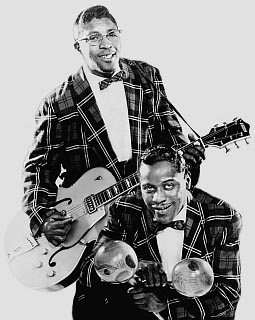
When Lady Bo departed, Diddley found another guitar-slingin' woman for his touring lineup. Starting in 1962, The Duchess (a.k.a. Norma Jean Wofford) kept the band (and audiences) on their toes for several years; onstage, Bo called her his "half-sister." In 1965, he teamed with labelmate Chuck Berry for the album Two Great Guitars, released on Checker (as opposed to Chuck's Chess); the set was all-instrumental and contained just four tracks (extended jams "Chuck's Beat" and "Bo's Beat" were edited for release on a single). By that time a younger generation of rock and rollers were unleashing their own versions of songs by basically everyone who'd been anyone at Chess-Checker in Chicago. Some notably reimagined Diddley classics include "Mona" by The Rolling Stones, "Road Runner" by The Gants, "I'm a Man," a top 20 hit for The Yardbirds in '65, two simultaneous versions of "Diddy Wah Diddy" in the spring of '66 by The Remains and Captain Beefheart and his Magic Band, "Oh Yeah," a top 40 hit the same year for The Shadows of Knight, "Who Do You Love" by The Woolies in '67 and Quicksilver Messenger Service in '69...and, later, many more. Plus, Brit rockers The Pretty Things paid tribute by naming their band after the title of his third hit single...pretty cool!
"Ooh Baby" became Bo's final chart entry in early 1967. Although he'd long had issues with the Chess brothers over fair compensation, he remained with the company until 1974. After doing a remake of "Not Fade Away," a Diddley-inspired Buddy Holly original, for RCA in 1976, he occasionally made albums for various labels, regularly toured and sometimes teamed with the latter-day rockers who idolized him. Several film roles followed, starting with a brief turn as a pawnbroker in the 1983 comedy Trading Places. Ellas McDaniel, who holds a place near the top of rock and roll's legacy as the distinctive innovator with an absurd but well-regarded professional name, kept performing until 2008, when he, and the Bo Diddley era, passed into history. Fans continue rockin' to that sound and it's still rightfully referred to (evolving trademark laws notwithstanding) as the "Bo Diddley Beat!"
NOTABLE SINGLES:
- Bo Diddley /
I'm a Man - 1955 - Diddley Daddy - 1955
- Pretty Thing /
Bring it to Jerome - 1955 - Diddy Wah Diddy - 1956
- Who Do You Love? - 1956
- Cops and Robbers - 1956
- Hey! Bo-Diddley /
Mona - 1957 - Say! (Boss Man) - 1957
- Hush Your Mouth /
Dearest Darling - 1958 - Willie and Lillie /
Bo Meets the Monster - 1958 - I'm Sorry /
Oh Yea - 1959 - Crackin' Up - 1959
- Say Man /
The Clock Strikes Twelve - 1959 - Say Man, Back Again - 1959
- Road Runner - 1960
- Crawdad - 1960
- Gun Slinger - 1960
- Not Guilty - 1961
- Pills - 1961
- You Can't Judge a Book by the Cover - 1962
- Surfers' Love Call - 1963
- Chuck's Beat - 1964
by Bo Diddley and Chuck Berry /
Bo's Beat - 1964
by Bo Diddley and Chuck Berry - We're Gonna Get Married - 1966
- Ooh Baby - 1967
- Bo Diddley 1969 - 1969
- The Shape I'm In /
Pollution - 1971 - Bo Diddley-Itis - 1972
- Husband-In-Law - 1972
- Don't Want No Lyin' Woman - 1973
- Not Fade Away - 1976


